The Future of Digital Agriculture: Process for Progress
Food and Agriculture Organization of the United Nations
Session 349
Reflecting and Building on WSIS 20 years’ journey
Over the last 20 years, since its implementation in its first two phases, Geneva in 2003 and Tunis in 2005, the World Summit on the Information Society (WSIS) Forum has been instrumental in shaping global discussions and policies around the use of information and communication technologies (ICTs) for development worldwide. This year's anniversary with the celebration of WSIS+20 not only marks a decisive milestone in our common journey and the implementation of the Forum's original goal, towards building people-centric, inclusive, and development-oriented information and knowledge societies, but also brings us a unique opportunity to truly reflect on the achievements realized so far and set a sustainable way forward, for an ethical and safe use of ICTs in a landscape that is now more fast paced than ever with the emergence of new disruptive technologies such as AI, capitalizing on lessons learnt and best practices, built through joint efforts at the global level.
Since its beginning, FAO has recognized WSIS crucial role in promoting global digital cooperation and collective action towards harnessing the transformative potential of ICTs for the achievement of the Sustainable Development Goals (SDGs) and the broader agenda of inclusive and sustainable development. Since then, the Organization has been gearing its efforts towards making significant contributions to WSIS, particularly in the realm of utilizing information and communication technologies (ICTs) for agricultural development and food security.
Some of FAO's major contributions to WSIS include: promoting digital technologies for agrifood systems transformation – with initiatives to harness mobile technology, remote sensing, geographic information systems (GIS), and other digital tools to support farmers in decision-making, crop management, and natural resource conservation-; developing knowledge sharing platforms and digital resources to facilitate the exchange of information and best practices among agricultural stakeholders; fostering capacity building -to enhance digital literacy and technical skills among farmers, extension workers, and agricultural professionals-; establishing the global E-Agriculture Community, as a collaborative platform for stakeholders to share knowledge and innovative solutions in using ICTs for agriculture and rural development-; providing policy support and technical assistance to governments and regional organizations in developing ICT policies and strategies for agricultural development; and finally, forging partnerships with other UN agencies, international organizations, academia, and civil society groups to advance the use of ICTs for agriculture within the broader context of sustainable development.
This session will highlight how FAO's major contributions to WSIS, strengthened through strategic partnerships, have helped raise awareness of the transformative potential of digital technologies in agrifood systems over the last 20 years and catalyzed efforts to leverage digital innovation for food security, poverty reduction, and rural development worldwide.
With the participation of FAO leadership and management representatives, as well as some of its main partners, that will bring forward concrete examples of amplified use of digital tools, big data, artificial intelligence, coherent action and enabling mechanisms for strengthening digital capabilities, FAO's session will build on the Vision for WSIS Beyond 2015, towards 2025 and mark progress towards also important UN led initiatives such as the Global Digital Compact and the Summit of the Future, showcasing how, despite new challenges to tackle, but with new solutions to bring and new partnerships to build, the safe and ethical use of digital technologies, including AI, is now more than ever a critical component for accelerating the full implementation of the 2030 Agenda for Sustainable Development leaving no one behind.
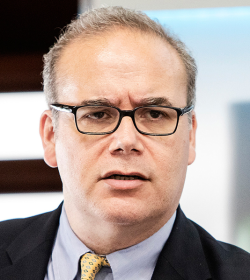
Mr. Máximo Torero Cullen is the Chief Economist of the Food and Agriculture Organization (FAO). He joined the Organization in January 2019 as Assistant Director-General for the Economic and Social Development Department.
Prior to joining FAO, he was the World Bank Group Executive. Director for Argentina, Bolivia, Chile Paraguay, Peru and Uruguay since November 2016 and before the Bank, Mr. Torero led the Division of the Markets, Trade, and Institutions at the International Food Policy Research Institute (IFPRI).t
His major research work lies mostly in analyzing poverty, inequality, importance of geography and assets (private or public) in explaining poverty, and in policies oriented towards poverty alleviation based on the role played by infrastructure, institutions, and on how technological breakthroughs (or discontinuities) can improve the welfare of households and small farmers.
His experience encompasses Latin America, Sub-Saharan Africa, and Asia.
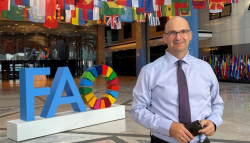
Mr. Jakovljevic is the Director of the Digital FAO and Agro-Informatics Division and Chief Information Officer of the Food and Agriculture Organization of the United Nations (FAO).
He has more than 20 years of IT experience and use of technology in International Development. He is a strategic leader in the field, aiming to harness the power of technology towards achieving SDG goals. His work focuses on driving Digital Transformation, organizational modernization and enabling Innovation scale up and delivery.
Prior to joining FAO, Mr Jakovljevic held positions with UNICEF and WHO, with leadership roles in East Asia and Pacific, European Region, and driving global initiatives in the other parts of the world. Mr. Jakovljevic has Master's and Bachelor's degrees from the University of Houston, Texas.

Henry is a national of the Netherlands with 20 years of experience in digital innovation. He has always explored new boundaries for the use of digital solutions for agrifood systems transformation and accelerating the achievement of the Sustainable Development Goals.
He firmly believes digital technologies are a powerful means of implementing agrifood systems transformation through speed and scale of uptake; reduced deployment costs; growth in public awareness; delivery of innovation, connectivity, productivity and efficiency gains across sectors.
In the framework of FAO’s work, it is about creating value and impact for achieving the FAO Strategic Framework 2022-31 and the Sustainable Development Goals (SDG) action agenda, leaving no one behind. This means special attention for the most vulnerable people; women, youth and the rural poor.
He leads the FAO Programme Priority Area on Digital Agriculture that is part of the FAO Strategic Framework 2022-31, and leads the Digital Agriculture Unit in the FAO Office of Innovation. He also acts as Lead Technical Officer of the Global Network of Digital Agriculture Innovation Hubs.
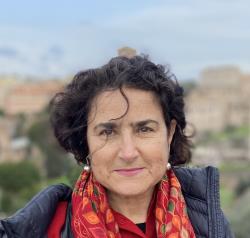
Ms Treinen has 37 years of information and communication experience in International Development, out of which 24 with the Food and Agriculture Organization of the United Nations (FAO).
Since early 2000’s, she has been mainstreaming gender in ICTs, incorporating this dimension in FAO projects and programmes, resulting in several subsequent publications for FAO and the World Bank. She was part of WSIS since its inception and has led for several year FAO e-agriculture community of practices. Under her leadership, the Digital agriculture team was created for FAO Regional Office of Europe and Central Asia, working hand in hand with the International Telecommunications Union (ITU) for the development of e-agriculture strategies and the contest on digital excellence in agriculture. Ms Treinen also initiated the concept of twining Smart villages of Europe with FAO Digital Village initiative.
Prior to joining FAO, Ms. Treinen held positions within the European Union, the civil society and the private sector. She has a Master's degrees from the University of Louvain-La -Neuve, Belgium in social communication and development.

Sebastian Bosse is heading the Interactive & Cognitive Systems Group in the Vision and Imaging Technologies Department, at Fraunhofer Heinrich Hertz Institute (HHI), Berlin, Germany.
Mr Bosse is a lecturer at the German University in Cairo. He is on the board of the Video Quality Expert Group (VQEG) and on the advisory board of the Interational AIQT Foundation. He is an affiliate member of VISTA, York University, Toronto, and serves as an associate editor for the IEEE Transactions on Image Processing. Since 2021, he has been appointed a chair for the ITU focus group on Artificial Intelligence for Agriculture.
His current research activities center around computational perception and cognition, machine learning, computer vision, and human-machine interaction and cover a wide field of applications ranging from multimedia and augmented reality, through medicine to agriculture and industrial production.
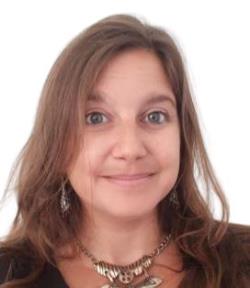
Ms Grossi is an international advocacy, capacity building, cooperation and public relations expert with 6 languages and 15 years of work experience in external relations, public affairs and project coordination within international organizations and research institutes. She currently serves as programme officer in FAO's office of the Director-General leading the strategic outreach, awareness raising and capacity building strategic activities, also supporting programme implementation, for digitalization and data protection related topics, to better streamline understanding, sensitization and compliance overall.
She held previous positions within the Organization for Economic Cooperation Development (OECD), the European Forest Institute (EFI) with the European Commission, the International Atomic Energy Agency (IAEA), the United Nations Industrial Development Organization (UNIDO) and the Organization for Security and Cooperation in Europe (OSCE), as well as several experiences in the private sector and NGOs in the field.
She has been focusing on multicultural impact and solution delivery oriented work across 4 continents including Austria, Argentina, Brazil, Belgium, France, Finland, Japan, Italy, Kenya, Spain, Vietnam, Tanzania, Peru, Switzerland and is deeply committed to identify and leverage opportunities for Growth and Sustainable Development in fast paced and innovative environments.
-
 C7. ICT applications: benefits in all aspects of life — E-agriculture
C7. ICT applications: benefits in all aspects of life — E-agriculture
Overall, FAO's initiatives in digital agriculture contribute directly to the objectives of the WSIS Action Line C7, for which the Organization has been a facilitator since its early beginnings, by harnessing the potential of ICTs to drive innovation, efficiency, and sustainability in the agricultural sector, thereby advancing the broader goals of inclusive and sustainable development.
The link between Food and Agriculture Organization (FAO) initiatives showcased in the session, with the support of its implementing partners, and the World Summit on the Information Society (WSIS) Action Line on digital agriculture is therefore significant and this event aims at reinforcing its key outcomes, in the past and for the future, in a collaborative perspective.
The WSIS Action Line C7 on e-agriculture specifically focuses on the use of information and communication technologies (ICTs) to enhance agricultural productivity, sustainability, and rural development. FAO's digital initiatives align closely with this Action Line, as they aim to leverage ICTs to address challenges and unlock opportunities in the agricultural sector, while keeping abreast of the latest developments worldwide to best address the world's global challenges, through targeted interventions to reduce poverty, hunger and increase economic development, directly contributing to the Sustainable Development Goals.
By focusing on knowledge sharing, through the use of its digital platforms- such as the awards winners FAO Digital Services Portfolio and Hand in Hand Geospatial Platform- that provide access to agricultural data, technical resources, and decision-support tools; as well as by fostering capacity building, through training programs, workshops, and e-learning initiatives, FAO helps build the human capital necessary to effectively utilize ICTs for agricultural development, in line with the WSIS Action Line's emphasis on building ICT skills and competencies.
FAO also promotes the adoption of ICT-enabled solutions to address agricultural challenges, such as climate change adaptation, pest management, and market access, which empower farmers to make informed decisions and improve their livelihoods.
By advocating for enabling policy environments and regulatory frameworks, FAO helps create conditions conducive to the deployment and sustainable use of ICTs in agriculture, aligning with the WSIS Action Line's focus on policy development and implementation.
Finally, FAO partnerships in the realm of digital agriculture aim at fostering knowledge sharing, resource mobilization, and joint initiatives to scale up ICT interventions and maximize their impact on food security and rural livelihoods.
-
 Goal 1: End poverty in all its forms everywhere
Goal 1: End poverty in all its forms everywhere
-
 Goal 2: End hunger, achieve food security and improved nutrition and promote sustainable agriculture
Goal 2: End hunger, achieve food security and improved nutrition and promote sustainable agriculture
-
 Goal 5: Achieve gender equality and empower all women and girls
Goal 5: Achieve gender equality and empower all women and girls
-
 Goal 8: Promote inclusive and sustainable economic growth, employment and decent work for all
Goal 8: Promote inclusive and sustainable economic growth, employment and decent work for all
-
 Goal 10: Reduce inequality within and among countries
Goal 10: Reduce inequality within and among countries
-
 Goal 12: Ensure sustainable consumption and production patterns
Goal 12: Ensure sustainable consumption and production patterns
-
 Goal 13: Take urgent action to combat climate change and its impacts
Goal 13: Take urgent action to combat climate change and its impacts
-
 Goal 15: Sustainably manage forests, combat desertification, halt and reverse land degradation, halt biodiversity loss
Goal 15: Sustainably manage forests, combat desertification, halt and reverse land degradation, halt biodiversity loss
-
 Goal 17: Revitalize the global partnership for sustainable development
Goal 17: Revitalize the global partnership for sustainable development
FAO's digital initiatives for agriculture have been instrumental over the past 20 years in supporting the achievement of multiple Sustainable Development Goals (SDGs), particularly those related to ending hunger, achieving food security, promoting sustainable agriculture, and fostering rural development. They have been demonstrating the transformative potential of digital technologies in advancing global efforts towards a more food-secure, inclusive, and sustainable future, as FAO session aims to further highlight through concrete examples of action in the ground.
Firstly, FAO's digital initiatives play a crucial role in achieving SDG 2 by improving agricultural productivity, enhancing food security, and promoting sustainable food systems. Digital technologies such as remote sensing, geographic information systems (GIS), further enabled by its new Agro-informatics platform and mobile applications such as FAO Digital Services Portfolio, help farmers optimize crop production, manage natural resources more efficiently, and access market information, ultimately contributing to reducing hunger and malnutrition. These effects can also be noted on SDG 12, ‘ensuring sustainable consumption and production patterns’ for all agricultural stakeholders and its beneficiaries at all levels, as FAO digital platforms facilitate consumer engagement, ‘from the farm to the fork’ promoting awareness, and enabling informed choices through seamless access to timely and relevant information on agrifood systems along their whole value chain.
FAO's digital interventions also empower smallholder farmers, rural communities, marginalized groups and vulnerable communities by providing access to information, resources, and markets to bridge the digital divide worldwide- reducing inequality within and among countries (SDG 10). By promoting inclusive digital access also in remote locations and fostering entrepreneurship through ICT-enabled solutions, FAO contributes in the most important way to poverty reduction and economic empowerment overall, aligning clearly with SDG 1's objective of eradicating poverty in all its forms and also contributing to SDG 8, to promote inclusive and sustainable economic growth, employment and decent work for all.
.
On another hand, FAO's digital initiatives prioritize gender equality and women's empowerment in agriculture, aiming at bridging the digital divide also by addressing the gender perspective, by ensuring women have equal access to and control over digital technologies, information, and decision-making processes. Through capacity building programs, gender-sensitive ICT interventions, and inclusive participation in digital platforms, such as the DSP implementation in Rwanda and Egypt, FAO supports women farmers and entrepreneurs, contributing to SDG 5's goal of achieving gender equality and empowering all women and girls.
FAO's digital initiatives contribute also to climate action, tackling climate change as one of today's major threads, by facilitating climate-smart agriculture practices and resilience-building measures. Through the use of ICTs for weather forecasting, precision agriculture, and natural resource management, FAO helps farmers adapt to climate change impacts and mitigate greenhouse gas emissions in the agricultural sector, in alignment with SDG 13's objective of taking urgent action to combat climate change and its impacts.
Finally, by fostering multi-stakeholder partnerships and knowledge sharing, FAO strengthens global cooperation and collective action towards sustainable development, in line with SDG 17's emphasis on revitalizing the global partnership for sustainable development.
Participation in WSIS+20 and leveraging its platform for visibility and strengthened synergies will therefore be crucial for FAO, its partners and all major stakeholders engaged in the food and agriculture sector to better align targeted actions in a common and sustainable ecosystem for digital related initiatives that will foster resilient agrifood systems and enable mutual benefits, leaving no one behind for a sustainable future.
1. DSP Material
Website
Home | FAO Digital Services Portfolio | Food and Agriculture Organization of the United Nations
Videos
General presentation https://youtu.be/BF5LJiBayPo
Playlist and thematic topics Videos | FAO Digital Services Portfolio | Food and Agriculture Organization of the United Nations
Arabic special section الفيديوات|حافظة الخدمات الرقمية في المنظمة |منظمة الأغذية والزراعة للأمم المتحدة (fao.org)
Publications
Ugani Kiganjani in Tanzania
All the extension agricultural services in your hands- also Swahili version
Bridging towards development- also Swahili Version
Pocketbook: Agricultural services in the palm of your hand
Links to download
General Digital Services Portfolio - Apps on Google Play
Ugani Kiganjani (Tanzania) Ugani Kiganjani - Programu zilizo kwenye Google Play
El Mufeed (Egypt) المفيد فى الأغذية والزراعة - التطبيقات على Google Play
SAIDA (Senegal) Agri Apps (SAIDA) – Applications sur Google Play
Hinga Worore (Rwanda) Hinga-Worore - Apps on Google Play
Ma’ Al Muzare (Jordan) Ma’ Al Muzare’ - NARC - Apps on Google Play
El Rafidain for Agriculture Extension (Iraq) الرافدين للإرشاد الزراعى - التطبيقات على Google Play
2. Agroinformatics Platform material
Videos
General presentation trailer
3. Hand in Hand Geospatial Platform
Website
https://www.fao.org/hih-geospatial-platform/en/
Videos
- General presentation trailer Introducing FAO Hand-in-Hand Geospatial Platform: To Build a Better Future For All
- Playlist and thematic topics Videos | Hand in Hand Geospatial Platform Youtube playlist https://youtube.com/playlist?list=PLzp5NgJ2-dK5m86R0Zt1CvHXKLfRvLv7L
- HIH GP Capabilities https://youtu.be/Caq2aoQWNOU
Training videos
All videos resources https://www.fao.org/hih-geospatial-platform/resources/videos/en
Other linked videos resources
Climate Risk Tool Box Video The Climate Risk Toolbox on the Hand-in-Hand Geospatial Platform - YouTube
The use of WaPOR data to monitor agricultural production in near real time
Publications
Technical guides
Getting started with HiH Geospatial Platform
The ABCs of application programming interface (API)
How to add tabular data
Comprehensive Knowledge Archive Network (CKAN) metadata publishing workflow Hand-in-Hand Data Catalogue Workflow Documentation (fao.org)
How to publish vector data
How to publish raster cubes
FAO-GISMGR Project GISMGR 2.0 API Reference
FAO-GISMGR Project - GISMGR 2.0 - User Manual
HIH GP- A detailed explanation https://www.youtube.com/watch?v=1ngjV6zp4pw
Other linked publications
Land Cover Legend Registry (LCLR)
Social Media Presence - Facebook, Twitter, Instagram, LinkedIn
Promotional tweets through E agriculture Account, ex: new crop intensity data released, general green and climate resilient agriculture in Pakistan…
Promotion through events and participation in international conferences, ex WSIS Forum https://twitter.com/FAOeagriculture/status/1636009540146679809?s=20
Linkedin COP E agriculture https://www.linkedin.com/feed/update/urn:li:activity:7044326244401700864?utm_source=share&utm_medium=member_desktop
Social media wall compilation #Digital4Impact
4. FLAPP- Food and Loss App
Intro trailer
Experts interview
Launch article
5. Digital Villages Initiative
Websites
Europe and Central Asia (publication)
Asia and the Pacific
Africa (Pilot DVI in Africa Publication)
Latin America
6. Digital Hubs
Website
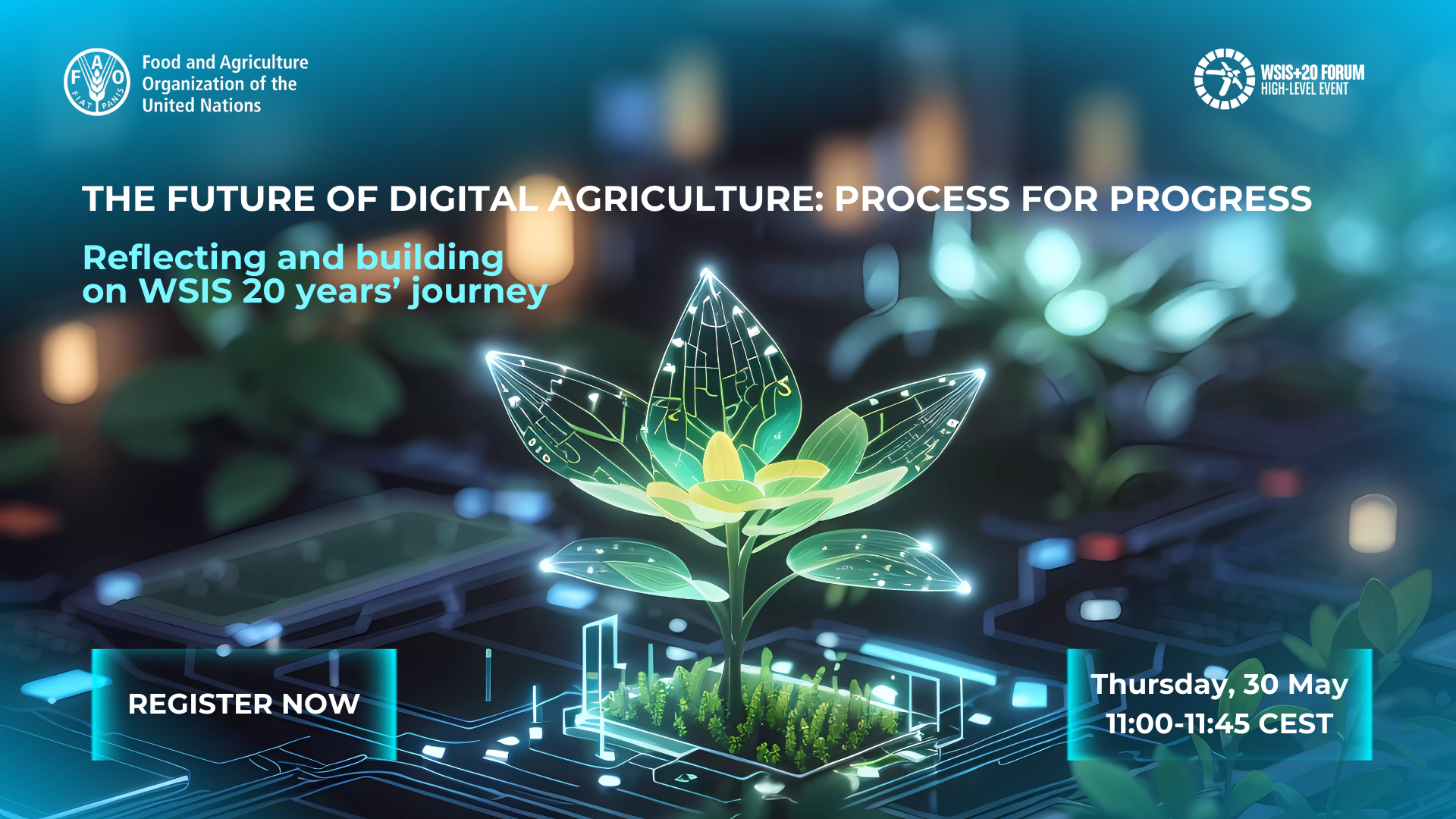
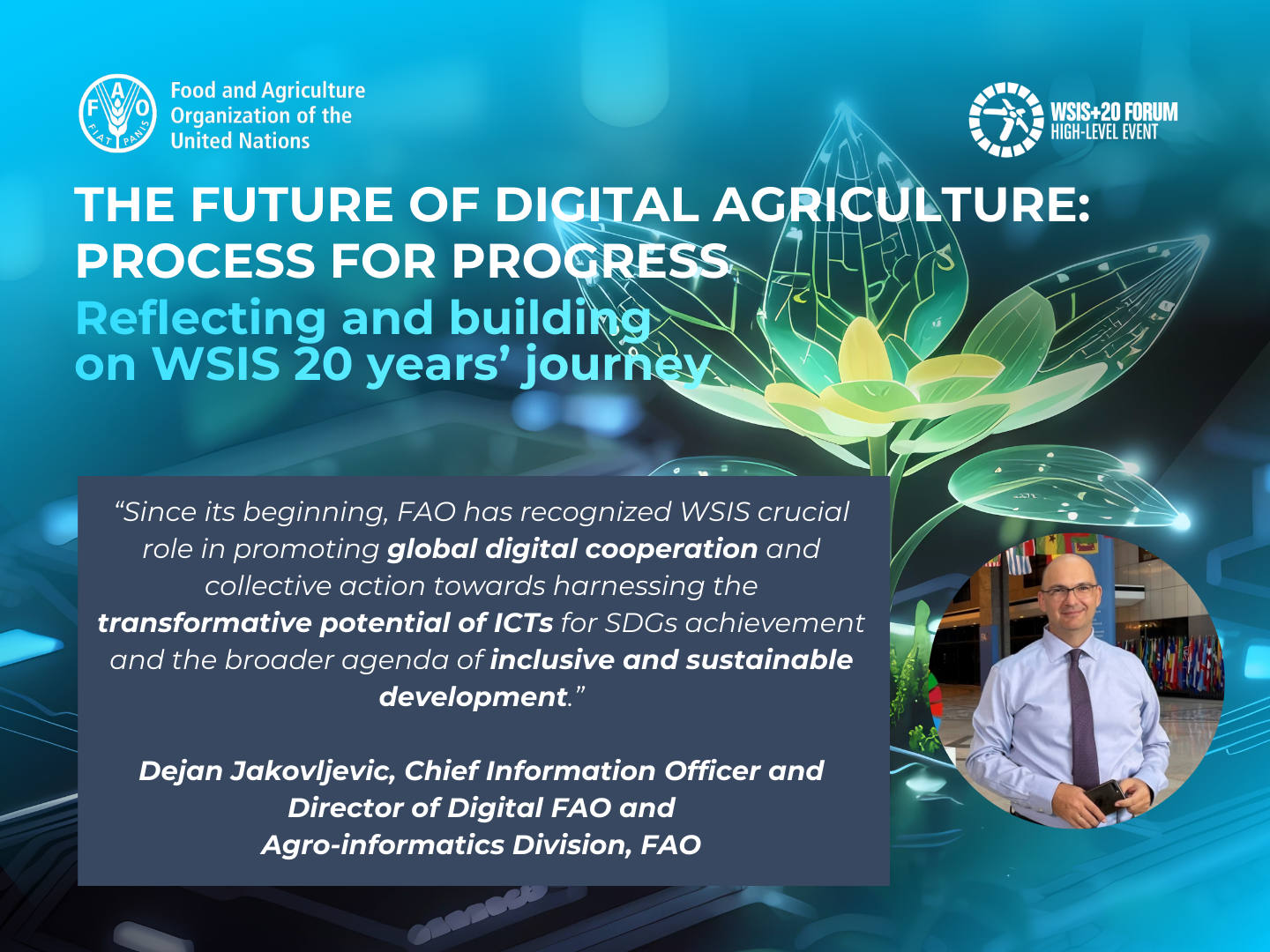
.png?maxwidth=2160)
.png?maxwidth=2160)
.png?maxwidth=2160)